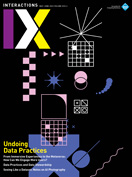Authors:
Alex Taylor, Daniela Rosner, Mikael Wiberg, Elizabeth Churchill
Many readers will have been exposed to, if not directly involved in, the now pervasive worlds of data. As practitioners and researchers designing and understanding the proliferation of technology, it's become impossible to ignore the unerring charge toward data worlds—these worlds enumerate bodies and experiences and extract data of all kinds, and, in a perversely reflexive way, dictate how we come to know, govern, and indeed experience life.
As consumers of technology, we feel data's pervasive presence through interactions on social media platforms, through our wider spheres of commercial and democratic transaction, and in the growing number of decisions made about our finances, health, well-being, and so much more. Lurking behind this immediate and visceral experience of data worlds are technoscientific, commercial, and governmental agglomerates that build and sustain a machinery of value and exchange. Such data worlds are not benign, but rather determine what counts as valuable, where data flows, and who wields control and power.
In this issue, contributors explore these data worlds through a sort of reverse engineering. But this is not a centering on (or valorizing of) technoscience with a narrow focus on technical means. Instead, it is to see data worlds as an entangled web of actors, agencies, and forces. And it is to see such webs at risk of intensifying and amplifying the very structures of power and control we have become so acutely aware of. Works in this issue seek then to undo data worlds in the hope that new webs are strewn and the promise of many more and radically different relations are made possible.
In Angelika Strohmayer and Michael Muller's dialogue, for example, the two authors' conversational back-and-forth explores the constitutive role of data practices, calling attention to the limits imposed through data science's established methods and inviting different modes of knowing and doing. Evelina Liliequist, Andrea Aler Tubella, Karin Danielsson, and Coppélie Cocq look closely at the binaries of sexuality and sexual identity to invite critical questions of the data and data practices that underlie the rise of AI. Here, data is seen as a source of bias and discrimination but also as a means to reimagine the possibilities. Eryk Salvaggio shows us a way forward through his creative endeavors in AI photography. As an allegory of sorts, Salvaggio's piece and his work show how AI and its sources of data can provide a medium with which to think differently about what is framed and bring new relations to the fore.
Beyond our Dialogues section, provocative and creative proposals for undoing data practices and reimagining the possibilities are dotted throughout the magazine. In our front matter, Subhashish Panigrahi (Blog@IX), Anuradha Reddy (Exhibit X), and Marijel Melo (Making/Breaking) each explore new routes for developing systems that use data and expressing meanings through data. In her forum piece, Janis Wong extends the thinking to reflect on new forms of collective stewardship and data governance.
Altogether these undoings of data worlds are an invitation to us to embark on or continue our projects that unsettle data's proliferation. There is an acknowledgment of data's potential but also a question posed to each of us about the direction we wish to travel.
In closing, two of us, Alex and Daniela, are bringing our tenure as co-editors-in-chief to a close with this issue. We are immensely grateful to the ACM team for their support during our tenure, which by any measure has been full of peaks and troughs. To John Stanik, Diane Crawford, Margaret Gray, and Andrij Borys, we are indebted. Sincerest thanks must also go to our stalwart contributors and readers who have energized us in our project to open up the magazine, seek an inclusive platform, and, dare we say, be a little disruptive in doing so. Our enthusiasm would have quickly waned without the support from so many.
Finally, we owe our deepest thanks to Mikael Wiberg, Amanda Windle, and Nadine Tanio, our partners during our tenure who have made everything better and without whom we could not have coped. We are so happy to see they, along with Elizabeth Churchill, will be steering the ship from here.
Alex Taylor, Daniela Rosner, Mikael Wiberg, and Elizabeth Churchill
[email protected]
Copyright held by authors
The Digital Library is published by the Association for Computing Machinery. Copyright © 2023 ACM, Inc.








Post Comment
No Comments Found